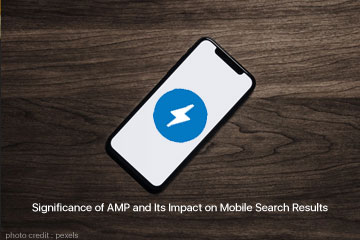
Accelerated Mobile Pages (Google AMP) is an initiative developed by Google that helps developers design mobile-friendly pages. It basically targets instant page loading on mobile devices. Launched in 2016, Google officially integrated Accelerated Mobile Page result for mobile search results. Webpages that use AMP coding appear with a special AMP lighting in the SERP.
This algorithm prioritizes speed for mobile devices. In fact, Google AMP ha a significant impact on website rankings. Therefore, the more you understand the AMP, the better your website ranking. Website speed is undoubtedly a positive factor when it comes to ranking in SERPs.
What Exactly Is Google AMP?
AMP uses HTML5 coding. It is a simple code that allows web publishers to develop a page that loads in a few seconds. It is basically an open-source project that instantly loads on all devices. This includes images, videos, audios and more.
JavaScript powers the speed of AMP, and the styling can be developed by using CSS3. The core reason behind the speedy delivery is the cache pages.
Significance of AMP For Marketers
There is always a "Need for Speed" in the business. Perhaps, this certainly has an impact on the SEO. AMP is a viable part of the SEO and helps marketers explore their possibilities. AMP follows Google's push toward mobile responsive websites. Therefore, the wave will rise exponentially.
AMP and SEO
AMP has direct effects to search engine optimization; likewise, speed is definitely an essential factor. If your website lacks speed, AMP will have a significant impact on the SEO. For instance, when two sites rank similar in SEO, the one with higher rate would have the edge over others.
Dos AMP Impacts Analytics?
The accuracy of analytics is challenging for AMP. Cookie restriction makes visitor identification more complex. Certain factors are making tracking much more difficult or uncertain.
LimitationsOf AMP
You need to know that the main aim of AMP is to make content swiftly available to the users. However, there are some drawbacks too. AMP is designed on HTML5, which is just a primary coding platform. Bells and whistles on your website may not work with AMP. Likewise, the advanced code is not compatible with AMP. In fact, AMP restricts page code usage.
You must run AMP supplied with equally limited JavaScript. When using forms, you need to rely on iframes. Apart from that, there are many other challenges.
Will AMP Limitations Impact Marketers?
AMP is basic, sophisticated branded designs, and you need to compromise on your website when it comes to extensive functionality. If you plan to use AMP, you have to negotiate functionality and design further prioritizing the speed.
You will also need to consider the fact that, shared links that are accessed via Google search and will go to Google.com URL rather than the marketer's site. This will have a substantial impact on the marketer's site.
Future Of AMP
AMP shows promising growth, but its future remains uncertain. Its popularity will rise only if large numbers of users allow it on their websites. So far, it has shown great success. Google has significantly invested in implementing AMP, and marketers can see great results if implemented correctly, especially if speed is the issue.
However, it is still in its developmental period. Although it has limitations, it could be utilized into web presence to increase your website ranking if speed is an issue possibly.